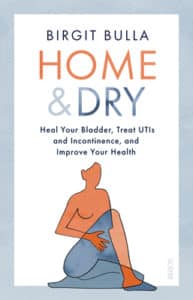It’s the kind of problem people don’t like to talk about, even with their doctors. Nonetheless, millions of people deal with overactive bladders and bladder infections. Every year, 10 million people visit doctors to deal with infections, and as many as 20 percent of people deal with overactive bladders once they hit 40. Unfortunately, people with chronic problems wait years to seek medical help for many reasons. Birgit Bulla knows about these problems firsthand. The German journalist started experiencing issues at 27 and went through hoops and hurdles with various doctors before a resolution. It’s an excruciating journey that helped form the basis of her book Home & Dry, which focuses on how individuals, particularly women, can find relief and understanding from bladder issues. Bulla recently spoke with WellWell about her journey, how sufferers can help themselves and why women seem underserved by urologists.
You came about this subject through a personal issue, correct?
Yes, it’s funny but also sad because for ten years, since I was 27, I’ve had an overactive bladder. That means I must go to the bathroom every 20 minutes. It’s annoying, embarrassing and difficult. Because of that, I started to write a blog about it to share my experiences. I thought it impossible that I was the only person in this world who suffered from this.
You’re a journalist, but do you have any background in medicine? Or did you dig into the issue and start researching?
I had no background in medicine; I started because of my suffering. I went from doctor to doctor, and nobody could help me. I began to research. I read so many books about it and asked so many people that now I am the expert.
How big of an issue is an overactive bladder? Does the problem stem from the same conditions for everyone?
Well, your daily routine is entirely different when you deal with an overactive bladder compared to a regular person. For example, when you want to go out, it’s weird. I first think, “No, I can’t,” and when I do, I think, “Where’s the next toilet? How many people are there? How long do I have to wait? What happens if I can’t make it? Do I need a change of clothes? How embarrassing will it be?” It’s always in your head like something isn’t right in your body. Peeing is a factor in my head; it’s stuff regular people never would think.
Millions of people we know suffer from these problems, correct?
Yeah, but there are also many different aspects to it. If you have an overactive bladder, you can have some incontinence. It’s hard to get an accurate number with so many issues involved.
But we’re talking about tens of millions of people.
Yes, and it’s more than we think because so many people are super embarrassed to talk about it, so they don’t speak out, and nobody knows.
You wrote when you came down with the condition, you went to a lot of doctors, and they were either not highly aware of the problem or didn’t think it was important. Why was that?
I went to a female urologist. I thought, “Cool, there’s a woman like me, and I’m going to be fine.” She didn’t even look at me. She just said: “Okay, take the antibiotics because I think you have a bladder infection, and you’re going to be fine,” I thought: “Okay, strange.” It went a long time like that. So many U-doctors are more specialized for men’s problems, like the prostate.
I’m not an expert on female overactive bladder stuff, but I knew it was not an infection. I had no idea then what the problem was, but many doctors thought I was overreacting. They’d say: “Are you sure it’s weird? Maybe you’re in your head, and it’s not real.” That was hard. The first treatment I got was at least a year after I went to the first doctor. Many urologist doctors are more focused on men and not women. It was frustrating.
What kind of treatments did you have that you reacted positively?
The usual way is that you start with some medications. There are so many medications that you can take to relax the bladder. Many work the same, but so many companies sell them. I tried every different type. Some worked okay, but I’m still young and don’t want to take medication daily and be addicted to them. There must be another way to treat me. In addition, these medications have side effects like headaches, dry mouth, and dry eyes. I wasn’t sure this was something I wanted to deal with for the rest of my life.
I also tried pelvic floor training. It’s something that everyone who suffers from bladder problems should try. But the best thing I did was Botox injections. That was my final treatment, and I was happy with it.
How long did it take for you to get Botox injections?
Five years. In the beginning, they helped. The longer I took them, the less effective. But there weren’t any side effects because it’s local in the bladder and the bladder muscle.
You’ve been doing that for about five years, and it has brought this issue under control for you?
Yes, the Botox lasts at least one year. Annually, you go to the doctor, and he puts Botox in your bladder, and it’s free for the rest of the year.
How did you then get to the Botox treatment?
In the beginning, I thought it was experimental because just one female U-doctor told me about it, and I was like, “Botox? Me? No way.” It’s not my lifestyle, and I’m super scared. And then I researched a bit, and I thought it was the last chance because I can’t live like this. But then, the more often I did it, the more I thought it felt completely normal, and now more doctors talk about it. I think it’s more normalized than five years ago.
In your book, you see more women suffering from these issues than men, even though there’s more focus on men; is that correct?
Yes, I believe that because women are more affected by a bladder infection. It’s a biological issue. You can get an overactive bladder due to a bladder infection. That wasn’t the case for me, but it’s possible. An overactive bladder is not a disease, but a problem, which is quite often psychosomatic. The issue can get worse as women age and hormones change.
Do you think doctors are more aware of dealing with overactive bladders in women today, and is there still reluctance for people, particularly women, to address these issues?
Yes, it’s hard. Women may hide it because sometimes doctors say: “Yes, sorry. You have an overactive bladder. There’s nothing we can do about it.” They will give you some medication and don’t try to fix the problem or search for the cause. It’s like having a migraine daily and doctors who see you are like, “I’m sorry, you have a migraine; live with it.” You can’t fix it because you don’t have a cause. Sometimes they don’t even want to try to solve it. I went to a young doctor; I think he was one year older than me, and he looked at my test results and said: “Oh my God! It’s so strange for a woman at your age. This looks more like a man in his 80’s.”. I said, “Cool! Then there, see? Now do something about it.” He said: “No, thank you. You must go to your own U-doctor. Bye.”
The last chapter is an offbeat take on the bladder and urination. Why is that included?
The funny stuff? It’s vital to laugh about it because it’s a hard thing for me. I’m suffering. But it’s also so important to laugh about it because we’re not dying from it. I won’t die from an overactive bladder.

About Birgit Bulla
Birgit Bulla is a journalist from Munich and works as a freelance editor for various magazines. In her mid-twenties, she developed an irritable bladder. Her blog is pinkelbelle.de.
Find Home & Dry on Amazon.














